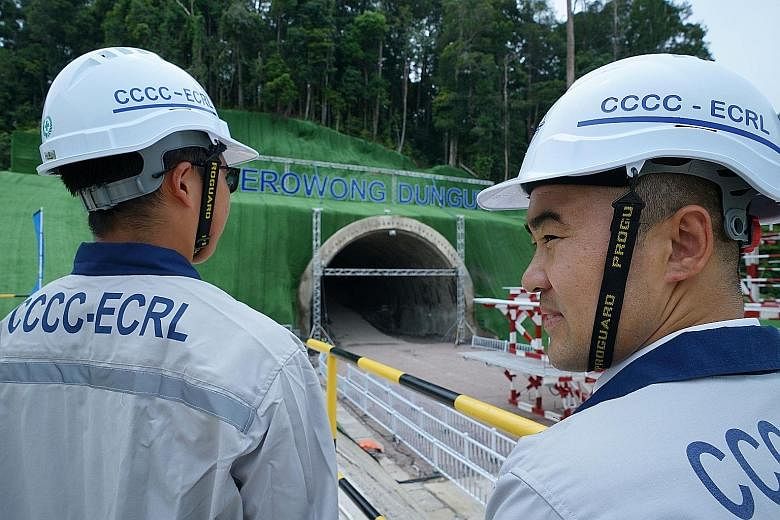Malaysia yesterday relaunched its East Coast Rail Link (ECRL), kick-starting work on tunnels and viaducts along part of the route, from Dungun in Terengganu state to Mentakab in Pahang, after a year-long suspension and following a deal to slash costs.
"A supplementary agreement on the financing for the ECRL will be signed (with China's Exim Bank) soon to finance 85 per cent of the project," Transport Minister Anthony Loke said at the relaunch ceremony held at the site of a tunnel being built in the coastal district of Dungun.
As the cost of the project has been trimmed to RM44 billion (S$14.6 billion), the government will pay less on interest, he added.
The interest payment on the loan "will be reduced to RM24 billion altogether on the financing costs. So the total savings is RM12.6 billion," project owner Malaysia Rail Link (MRL) chief executive Darwis Abdul Razak told a news conference.
Work on the China-linked ECRL project, which will connect Malaysia's less-developed eastern coast to the wealthier western coast, was suspended shortly after the Pakatan Harapan government, which assumed office last year, complained about its exorbitant price tag.
The cost of the project, approved by the previous Najib Razak administration, was subsequently reduced and the route shortened following renegotiations with China.
In April, China reduced the price for the ECRL to RM44 billion from the original RM65.5 billion and also agreed to a 50:50 joint venture to operate the 640km line across Peninsular Malaysia, reducing Kuala Lumpur's financial risks.
Local workers are expected to make up 70 per cent of the workforce.
Malaysia had previously said it could not afford to terminate the agreement as compensation of RM21.78 billion would have to be paid to Beijing.
The rail link is expected to spur investment as well as boost tourist arrivals.
China's Ambassador to Malaysia Bai Tian said in his speech at the event: "Many Chinese tourists are very aware of the beautiful islands in the east coast of Malaysia, but sometimes they are (deterred) by the difficulty of travelling to these islands. We believe with the completion of the ECRL, the Chinese tourism arrivals will double or quadruple in the years to come."
Earthworks and excavation works have begun on several ECRL tunnel portal sites, including the 871m Dungun tunnel, 1.1km Paka tunnel and 2.8km Kuantan tunnel, while site clearing and pile testing for viaducts are being carried out on several sites in the coastal areas of Terengganu.
"We are ready for full-scale civil works, be it earthworks, foundation works or piling works, on multiple sites along the 223km stretch from Dungun to Mentakab, in a bid to ensure the entire project is delivered in seven years," said Datuk Seri Darwis.
A supplementary agreement inked between China Communications Construction Company and MRL on April 12 in Beijing paved the way for the resumption of work on the line that joins up the ports of Klang in the west, to Kuantan in the east, before heading north along the east coast towards Kota Baru, the capital of Kelantan.
Expected to be completed by December 2026, the ECRL will link Kota Baru to Putrajaya in four hours. About 10 per cent of the line was already built before the project was suspended in July last year.

